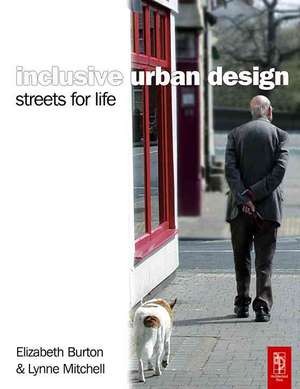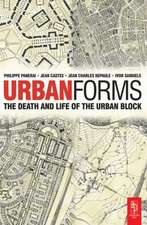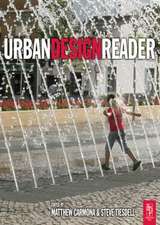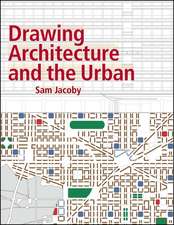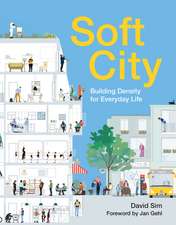Inclusive Urban Design: Streets For Life
Autor Elizabeth Burton, Lynne Mitchellen Limba Engleză Paperback – 3 mar 2006
Part one examines the changing experiences of people in the outdoor environment as they age and discusses existing outdoor environments and the aspects and features that help or hinder older people from using and enjoying them. Part two presents the six design principles for ‘streets for life’ and their many individual components. Using photographs and line drawings, a range of design features are presented at all scales of the outdoor environment from street layouts and building form to signs and detail. Part three expands on the concept of ‘streets for life’ as the ultimate goal of inclusive urban design. These are outdoor environments that people are able to confidently understand, navigate and use, regardless of age or circumstance, and represent truly sustainable inclusive communities.
| Toate formatele și edițiile | Preț | Express |
|---|---|---|
| Paperback (1) | 432.63 lei 43-57 zile | |
| Taylor & Francis – 3 mar 2006 | 432.63 lei 43-57 zile | |
| Hardback (1) | 1002.68 lei 43-57 zile | |
| Taylor & Francis – feb 2016 | 1002.68 lei 43-57 zile |
Preț: 432.63 lei
Nou
Puncte Express: 649
Preț estimativ în valută:
82.78€ • 86.65$ • 68.90£
82.78€ • 86.65$ • 68.90£
Carte tipărită la comandă
Livrare economică 31 martie-14 aprilie
Preluare comenzi: 021 569.72.76
Specificații
ISBN-13: 9780750664585
ISBN-10: 0750664584
Pagini: 200
Ilustrații: Approx. 100 illustrations
Dimensiuni: 189 x 246 x 11 mm
Greutate: 0.37 kg
Ediția:1
Editura: Taylor & Francis
Colecția Routledge
Locul publicării:Oxford, United Kingdom
ISBN-10: 0750664584
Pagini: 200
Ilustrații: Approx. 100 illustrations
Dimensiuni: 189 x 246 x 11 mm
Greutate: 0.37 kg
Ediția:1
Editura: Taylor & Francis
Colecția Routledge
Locul publicării:Oxford, United Kingdom
Public țintă
Professional Practice & DevelopmentCuprins
Part 1;Streets for Life – Why?;The origins of the Streets for Life concept;The need for dementia-friendly streets;Older people’s experiences of their local streets;Part 2;Streets for Life – How?;Introduction;Familiarity;Legibility; Distinctiveness;Accessibility;Comfort;Safety;Part 3; Streets for Life – The Future?;Streets for Life in practice;Going further with Streets for Life;Bibliography;Subject index
Recenzii
"a well researched and easy-to-read book"
Building Engineer, August 2007
"This is an excellent book which places the
importance of including the needs of older people firmly on the urban design agenda."
Urban Policy and Research, 25:2, 2007
Building Engineer, August 2007
"This is an excellent book which places the
importance of including the needs of older people firmly on the urban design agenda."
Urban Policy and Research, 25:2, 2007
Notă biografică
Elizabeth Burton, Lynne Mitcpson
Descriere
This is the first book to address the design needs of older people in the outdoor environment. It provides information on design principles essential to built environment professionals who want to provide for all users of urban space and who wish to achieve sustainability in their designs.
Part one examines the changing experiences of people in the outdoor environment as they age and discusses existing outdoor environments and the aspects and features that help or hinder older people from using and enjoying them. Part two presents the six design principles for ‘streets for life’ and their many individual components. Using photographs and line drawings, a range of design features are presented at all scales of the outdoor environment from street layouts and building form to signs and detail. Part three expands on the concept of ‘streets for life’ as the ultimate goal of inclusive urban design. These are outdoor environments that people are able to confidently understand, navigate and use, regardless of age or circumstance, and represent truly sustainable inclusive communities.
Part one examines the changing experiences of people in the outdoor environment as they age and discusses existing outdoor environments and the aspects and features that help or hinder older people from using and enjoying them. Part two presents the six design principles for ‘streets for life’ and their many individual components. Using photographs and line drawings, a range of design features are presented at all scales of the outdoor environment from street layouts and building form to signs and detail. Part three expands on the concept of ‘streets for life’ as the ultimate goal of inclusive urban design. These are outdoor environments that people are able to confidently understand, navigate and use, regardless of age or circumstance, and represent truly sustainable inclusive communities.
